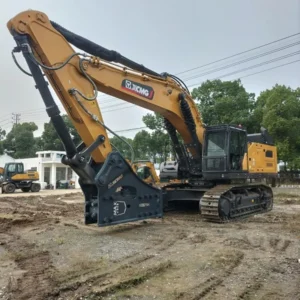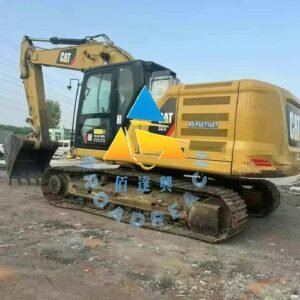BroadReach Construction Machinery Co., Ltd

The Role of Excavators in Different Industries: More Than Just Digging
Excavators are one of the most versatile machines in the world of construction and heavy equipment. You might initially think of an excavator as just a giant shovel digging holes in the ground. While that’s certainly part of its job, the role of an excavator extends far beyond that, playing a critical part in a wide variety of industries. Let’s take a deeper look at the incredible versatility of excavators and how they’re used in various sectors to make our world work.
1. Construction: The Foundation of Infrastructure
In the construction industry, excavators are an absolute necessity. Whether you’re building roads, bridges, or residential homes, these powerful machines are there from the start. Excavators are essential for:
- Site Preparation: Before any construction can begin, the land must be cleared, leveled, and prepared. Excavators are used to dig trenches, move earth, and remove debris.
- Foundation Work: Excavators dig deep foundation holes for buildings, ensuring a stable and level base.
- Excavation for Utilities: Plumbing, electrical lines, and drainage systems often need to be installed underground, and excavators help create the necessary trenches and channels.
With the right attachments, an excavator can even be used for demolition, moving large amounts of rubble or clearing entire buildings when a structure is no longer needed.
2. Mining: Digging Deep for Resources
The mining industry relies on excavators to extract valuable minerals and resources from the earth. While some mines use drilling and blasting, excavators are still the primary tool for:
- Digging and Extracting Materials: Excavators are used to scoop and transport minerals, coal, and other materials from the ground. Their large buckets can handle massive loads of earth and debris.
- Material Handling: Excavators help move materials into crushers or onto transport vehicles, ensuring a smooth flow of operations.
With specialized attachments like rock breakers or buckets, excavators can tackle tough, rocky terrain, allowing miners to access valuable resources deep below the surface.
3. Landscaping and Forestry: Shaping the Environment
Excavators are incredibly useful in landscaping and forestry work, where precision and efficiency are key. Here’s how they help:
- Grading and Leveling: Excavators are perfect for grading land, whether it’s preparing a garden bed or leveling a plot for a new park or golf course.
- Tree Removal: In forestry, excavators are used to pull out tree stumps, clear brush, or even remove entire trees when necessary.
- Soil Preparation: Landscaping often requires digging for water features, swimming pools, or plant beds, and excavators make these tasks much easier, especially when dealing with large areas or tough soil.
Excavators also help with the transportation of materials like gravel, soil, and mulch, making them indispensable for landscaping crews.
4. Agriculture: Beyond the Tractor
While tractors are often the go-to machines in agriculture, excavators have a place in farming as well. Farmers use excavators for:
- Land Clearing: Excavators are used to clear fields of trees, rocks, and other obstacles to make way for crops.
- Irrigation and Drainage: When setting up irrigation systems, excavators dig the trenches needed for pipes and channels.
- Earth Moving for Large-Scale Operations: For larger farms, excavators help move large amounts of soil, compost, or manure across fields, boosting efficiency.
In many cases, excavators offer the power and precision needed to perform tasks that a standard farm tractor can’t handle.
5. Environmental and Waste Management: Cleaning Up the Planet
Excavators also play a crucial role in environmental work and waste management. Whether it’s cleaning up a landfill, removing hazardous materials, or helping in the aftermath of a natural disaster, excavators help clear and restore affected areas.
- Hazardous Material Removal: Excavators with specialized attachments can remove contaminated soil, manage waste, or even clean up oil spills by scooping up debris without spreading contaminants.
- Disaster Response: After a natural disaster like a hurricane or earthquake, excavators are often on the front lines, clearing debris, digging through rubble, and helping rescue operations.
- Recycling: In recycling plants, excavators help move scrap metal, glass, and other recyclables to the appropriate processing areas.
Excavators’ flexibility and ability to adapt to various attachments make them invaluable in restoring our environment and keeping it safe.
6. Infrastructure Development: Building Our Cities and Roads
Urban development projects often involve complex infrastructure systems, from underground utilities to large-scale public works. Excavators are indispensable here as well, helping with:
- Underground Utility Installation: Excavators dig trenches for water pipes, electrical cables, and sewage systems that keep cities running smoothly.
- Paving and Roadworks: Excavators help with earth-moving tasks during road construction, grading the surface and providing material for the foundation.
- Demolition and Site Clearance: When existing buildings need to be cleared for new projects, excavators come equipped with demolition tools to safely tear down structures.
Without excavators, many of the roads, buildings, and utilities we take for granted wouldn’t be possible.
7. Civil Engineering: Shaping the Landscape
Civil engineering projects, like tunnels, dams, and large infrastructure developments, require excavation and earth-moving tasks on a grand scale. Excavators in this field help by:
- Tunneling and Trenching: Excavators are used in trenching for pipelines, electrical conduits, and tunnels, essential in civil engineering projects.
- Material Transport: Large-scale projects require the excavation and transport of massive amounts of material, and excavators can move large quantities of dirt, rock, and other materials efficiently.
Civil engineers use excavators in challenging terrains, such as mountainous regions or deep valleys, to shape the land and make construction possible.
Conclusion: A Backbone of Modern Industry
As you can see, excavators are not just machines that dig holes—they are an integral part of countless industries. From mining and construction to landscaping and waste management, they shape our world in more ways than we often realize. Their versatility, power, and adaptability make them indispensable for a wide range of tasks, and as technology advances, we can only expect their capabilities to grow.
So next time you see an excavator at work, take a moment to appreciate the role it plays in creating the world around us. Whether it’s building a new home, digging for resources, or restoring a damaged environment, these machines are working hard to keep our industries—and our lives—moving forward.Excavators are one of the most versatile machines in the world of construction and heavy equipment. You might initially think of an excavator as just a giant shovel digging holes in the ground. While that’s certainly part of its job, the role of an excavator extends far beyond that, playing a critical part in a wide variety of industries. Let’s take a deeper look at the incredible versatility of excavators and how they’re used in various sectors to make our world work.






